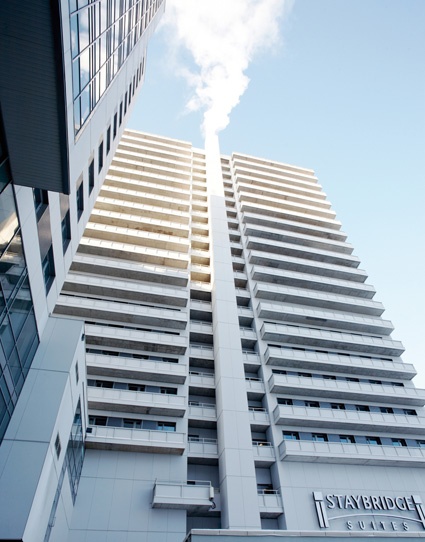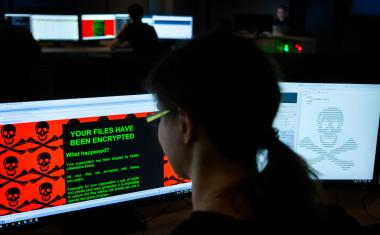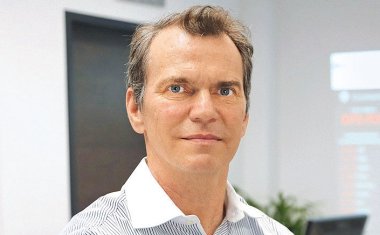Large Hotels Offer Particular Challenges to Safety and Fire Protection Systems
Cerberus Pro, the fire protection system from Siemens Building Technologies Division, has been successfully installed in a new hotel in St. Petersburg, Russia, by Confident, a Siem...


Cerberus Pro, the fire protection system from Siemens Building Technologies Division, has been successfully installed in a new hotel in St. Petersburg, Russia, by Confident, a Siemens Solution Partner.
The new hotel, an innovative, all-suite hotel with 294 rooms to meet the needs of extended-stay guests, is the very latest of the Staybridge Suites chain to be built and part of the world's leading hotel group in terms of number of guest rooms. The systems, supplied by Siemens through St Petersburg based Confident, were successfully commissioned and tested prior to the hotel's completion. The contract covered the supply and installation of one of the first Cerberus Pro fire protection systems in Russia - along with a MM8000 danger management station to connect the fire protection system with other security-related subsystems and building automation systems.
Efficient Fire Protection for Suites Is a Challenge
With so many guests - some still engaging in unauthorized smoking - and hotels invariably having busy kitchens and other hazards, the potential for false alarms is ever-present. Like all other Staybridge Suites, the new hotel is a residential-style hotel for business, relocation or leisure, located close to the commercial and leisure centers of the city. The apartment-style accommodation offers more space than would be found in a conventional hotel room and includes a fully fitted kitchen where guests do their own cooking. Reliable fire detection to safeguard the lives of so many guests and staff is obviously a priority, but the elimination of the disruption caused by unwanted alarms - and any ensuing full-scale evacuation of the hotel - is also very important.
Cerberus Pro is equally suited to stand-alone systems or extensive networks such as those needed in large hotel complexes. The sophisticated detection and control features of its products, such as optical, thermal and multi-sensor fire detectors, give speedy, accurate detection with alarm forwarding, allowing operators to assess any situation quickly and correctly. The broad range of specialist detectors includes linear smoke detectors for high-ceiling areas with limited accessibility such as for example in hotel buildings of historical importance. But most importantly, the integrated algorithms and selectable parameter sets of the detectors can be adjusted to prevalent environmental conditions, in order to minimize the possibility of false alarm.
The fire protection system in the St. Petersburg hotel comprised three Cerberus Pro FC724 panels and one Cerberus Pro FT724 terminal, all connected via a cluster, along with 1200 OP720 smoke detectors (306 with sounder bases), seven HI720 heat detectors and 89 manual call points. Cerberus control panels are easy to install, can be integrated into existing IT networks and feature an integrated Ethernet interface for connection to Siemens' MM8000 danger management system.
MM8000 is the highly flexible and scalable station that can be adapted to changing requirements any time, enabling centralized alarm management and supervision of a wide range of fire safety, electronic security, and control systems. All are displayed in clearly structured graphic layouts, giving a fast overview. Alarms and messages are listed according to security-relevant priorities, so operators have all relevant information at a glance and, in the event of any incident, are guided step by step through predefined procedures. At the new hotel, the MM8000 system comprised one server and one operator station, with 1600 points for integration.
Russian fire regulations, Modern Risk management plus EN 54 compliance
The new hotel is the first of four planned in the Russian city currently under negotiation between a number of owners and the IHG (Intercontinental Hotels Group), an international hotel company. The main priority of the St. Petersburg project for IHG was the gaining of full compliance not only with local Russian fire regulations but also with the requirements of its own risk management team.
Having experienced delays to the opening of a previous hotel when a competitor's fire system was installed, IHG's Mr. Jon Arrenberg, Director of Brand Safety Design - EU, ME & Africa, contacted Siemens for support and advice in this local project, acknowledging Siemens' capability to support global customers at all levels. The scalability, ease of configuration and wide range of Siemens' peripheral devices appealed to IHG who look for replicable technologies that can be applied consistently and efficiently in their hotels throughout the world. IHG particularly wanted sounder bases in every room at the St. Petersburg hotel to provide ‘cause and effect' programming that would normally require Programmable Logic Controls, with the additional benefit of full EN 54 compliance. This facilitates the provision of protection in a fully automated way with a specific timing pattern - for example, the phased evacuation of the hotel complex or the integration of smoke and damper controls within high-rise hotel blocks.
The close relationship and cooperation between its partner and Siemens - particularly the local office - helped secure the IHG contract in the first instance and paid dividends throughout the whole process of supply, installation and successful commissioning. Mr. Arrenberg commented "Having worked on previous projects with Siemens and their customized hotel solutions that integrate various areas of hotel infrastructure, we were confident in their ability to support us on this project too, at all levels through the combination of customer relationship management, local expertise and technological capability. We were also quickly convinced that their chosen partners on this project, Confident, were highly experienced and would readily be able to complete the awarded scope of work, gaining all necessary approvals and completing comfortably within the demanding time schedules."
Business Partner
Siemens Smart InfrastructureTheilerstrasse 1a
6300 Zug
Switzerland
most read

Training at Fraunhofer SIT: Strengthening resilience against cyber attacks
Knowledge in cyber security is evolving rapidly - continuous training is therefore important.

Is Your Venue Ready for Martyn’s Law?
Martyn’s Law demands stronger security by 2027. Is your venue prepared to protect and respond?

Safety and Security in an Emergency: How companies take responsibility with strategic personal protection and amok prevention
Personal protection & amok prevention: strategic concepts, training & responsibility for corporate safety and security

Assa Abloy's battery-powered Aperio KL100 secures lockers
Boost workplace security and operational flexibility by securing more than just doors.

When the Internet stumbles: Why DNS is important
When DNS fails, the internet stumbles-AWS outage proves resilience and redundancy are vital for digital trust








